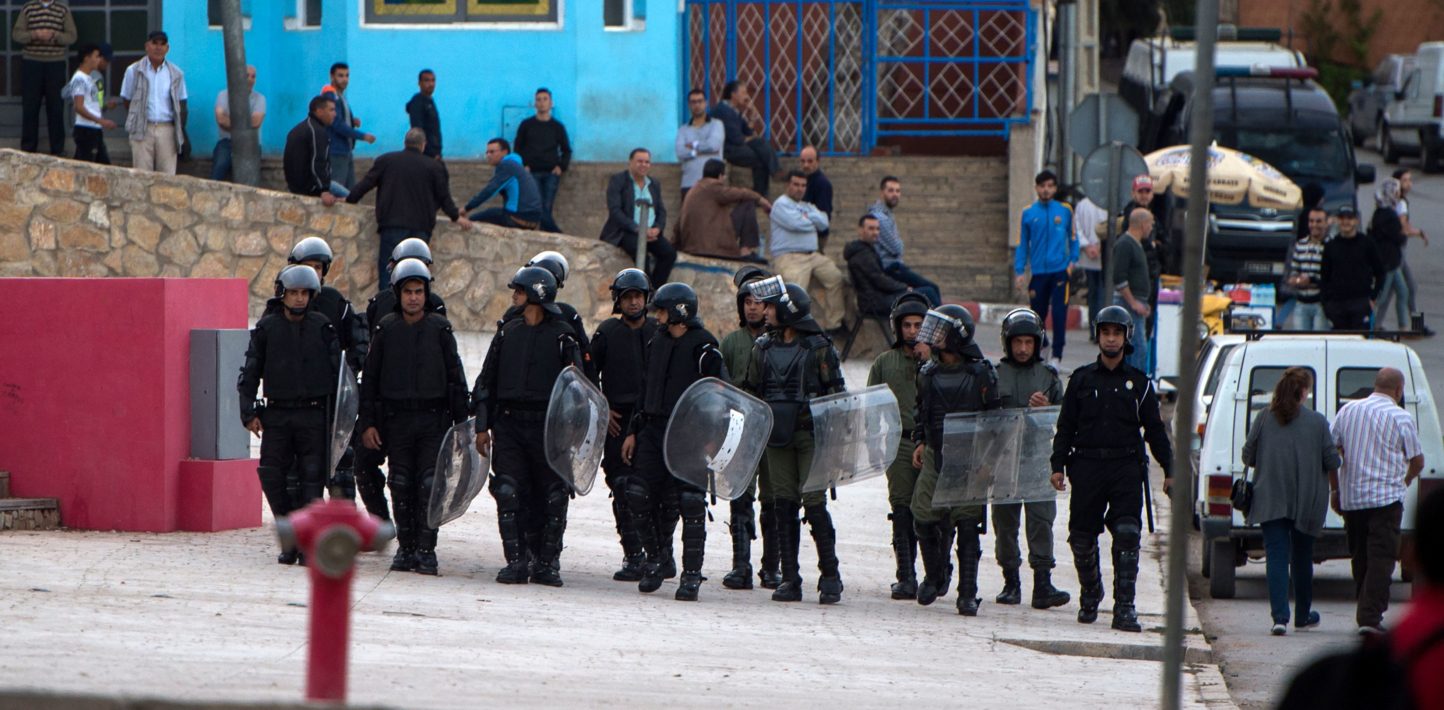The authorities must free Nasser Zefzafi and others detained for protesting peacefully or covering demonstrations online. They are prisoners of conscience,
Heba Morayef, North Africa Research Dirfector at Amnesty International
The Moroccan authorities must immediately and unconditionally release Rif protest leader Nasser Zefzafi as well journalist Hamid El Mahdaoui and all others detained in connection with the Rif protests and for peacefully exercising their human rights, said Amnesty International.
“The crackdown on Rif protesters in recent months has been relentless. The authorities must free Nasser Zefzafi and others detained for protesting peacefully or covering demonstrations online. They are prisoners of conscience,” said .
Since May, security forces have arrested hundreds of protesters, including children and several journalists over the largely peaceful protests. At least 410 people are currently detained, some of whom were arrested from their homes. Many have already been convicted, with some handed harsh prison terms of up to 20 years, while others, including minors, have been held for up to six months in pre-trial detention.
Protest leader Nasser Zefzafi has been detained for 176 days in prolonged solitary confinement, at the Ain Sbaa Local Prison, spending over 22 hours a day in individual cells with no meaningful human contact. Journalist Hamid El Mahdaoui has also been detained for several weeks in prolonged solitary confinement at the same prison. Prolonged solitary confinement, defined as for a period in excess of 15 days, violates the absolute prohibition of torture and other cruel, inhuman or degrading treatment.
“Even though pre-trial detention should only be used as an exceptional measure and should never be used as punishment, the Casablanca court has refused release on bail for 50 of 54 defendants in the Rif trials.” said Heba Morayef.
The Casablanca Court of Appeals is currently trying Nasser Zefzafi and fifty-three others in connection with the Rif protest movement, or Hirak in Arabic. Most charges brought against protest leader Nasser Zefzafi and his co-defendants are inconsistent with Morocco’s human rights obligations since they criminalise the peaceful exercise of the rights to freedom of assembly, association and expression.
Charges include unauthorized protest, rebellion, “plotting to undermine internal state security”, undermining “citizens’ loyalty to the Moroccan state and to the Moroccan people’s institutions”, “incitement against the kingdom’s territorial unity” and “insulting” public officials and institutions. Those charged with state security offences could, if convicted, face up to 20 years in prison. Some even stand accused of attempted murder and are facing possible life sentences.
Protesters described torture and other ill-treatment, including heavy beatings, suffocation, stripping, rape threats and insults, inflicted by police upon arrest and during interrogation, sometimes to force them to “confess” to crimes. In July, the Minister of Justice announced investigations into at least 66 cases of suspected police torture or other ill-treatment of protesters in custody. Judges have also failed to exclude statements possibly extracted under torture as incriminating evidence against the defendants in their trials so far, in breach of Morocco’s international anti-torture and fair trial obligations.
The prosecution has also accused Zefzafi of “inciting protesters to assault security forces” during their attempt to arrest him on 26 May. Amnesty International has closely examined the charge sheet and the evidence submitted by the prosecution against Zefzafi. The act in question, according to the prosecution, was when Zefzafi pointed his finger at security forces, calling them “repressive forces” and praying out loud “asking God almighty for [his] martyrdom”. Such words and acts do not amount to incitement to violence but constitute peaceful free expression.
Moroccan courts have already convicted persons accused of direct involvement in occasional fringe clashes involving protesters throwing stones and Molotov cocktails, including on 26 March 2017 in Imzouren. In this case however, the prosecution accused most of the 54 defendants of generally “inciting”, “participating” or being “complicit” in unrest without providing any evidence of their individual criminal responsibility with regards to any acts of violence.
The prosecution focused the defendants’ legitimate calls for or involvement in the protests including chanting peaceful slogans or purchasing fabric for banners or renting chairs for public meetings, or posting content about the protests on social media. It also focused on Facebook posts and the use of Facebook Live broadcast by activists as “incitement” to protest, and arrested bloggers and journalists who covered the protests on online news sites and Facebook.
Activists Mohamed Jelloul, Nabil Ahamjik, Mohamed Majjaoui, Achraf El Yakhloufi, journalists Mohamed El Assrihi and Fouad Saidi, and others within the group of 54 defendants have been detained on charges such as “undermining internal state security”, “incitement against the kingdom’s territorial unity”, “insulting” public officials and institutions and organising unauthorised protest, and must be immediately and unconditionally released.
The prosecution has also accused journalist Hamid El Mahdaoui of failing to alert the authorities about phonecalls he received from a man who claimed he planned to buy weapons and send them to Morocco to trigger a “war” in Al Hoceima, in the Rif. The journalist told the court he did not know the man or take him seriously. El Mahdaoui, an outspoken journalist, already convicted several times previously for denouncing abuses by officials, must be immediately and unconditionally released.
The prosecution has accused a minority of defendants of direct responsibility in specific acts of violence, including stone-throwing, arson and property damage. While Amnesty International has not been in a position to independently verify the evidence behind these claims, the court must guarantee the right to a fair trial for all defendants, including through the exclusion of statements elicited by torture, ill-treatment or coercion.
Activists continue to face arrests in the Rif region and authorities continue to impose protest bans, including recently on 28 October in the towns of Nador and Al Hoceima on the first anniversary of the death of fishmonger Mouhcine Fikri. His fatal crushing in a garbage truck while attempting to recover confiscated swordfish had ignited protests that crystallized into the Hirak protest movement.


